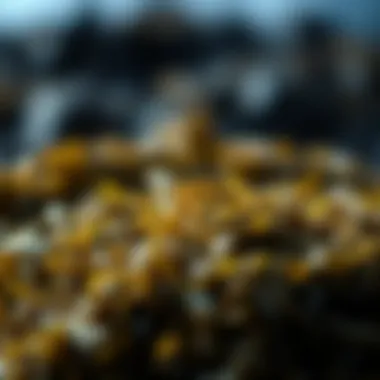Discover the Health Benefits of Dried Seaweed


Intro
Dried seaweed is capturing the attention of many health-conscious individuals and surfboarders alike. With this rising popularity, numerous questions arise about its health benefits and how it can be a valuable addition to a balanced diet. This article uncovers the nutrient profile of dried seaweed and its profound effect on well-being, especially for those hitting the waves.
Considered a superfood in many circles, dried seaweed is loaded with vitamins, minerals, and antioxidants. This article will explore specific types of seaweed, such as nori, dulse, and kombu, while shedding light on not only their individual contributions but also how they can improve endurance and recovery for athletes, particularly surfers. As we dive deeper, we’ll discuss culinary uses and some precautions to take when incorporating this salty delight into your meals.
Let's embark on this journey to better understand why dried seaweed may deserve a permanent spot in your pantry and on your plate, especially if you're riding the waves.
Nutritional Value of Dried Seaweed
Seaweed is not just for sushi anymore. Its impressive nutritional profile stretches far beyond its common roles in culinary dishes. Dried seaweed is often low in calories, making it an appealing choice for those watching their weight. Notably, it is rich in vital minerals such as iodine, calcium, iron, and magnesium, all of which support various body functions including bone health and metabolic rate.
In addition to minerals, seaweed also offers an array of vitamins—particularly vitamin K, which is essential for blood clotting, and a range of B vitamins that play critical roles in energy metabolism. Furthermore, the presence of fiber helps in digestion and contributes to gut health.
"Incorporating dried seaweed into your diet not only diversifies your nutrient intake but also supports sustainable food practices as it's easily farmed and harvested."
Potential Health Benefits
Seaweed is often celebrated for its numerous health benefits:
- Rich in Antioxidants: Protects the body from oxidative stress and supports overall health.
- Supports Thyroid Function: The iodine content plays a crucial role in maintaining healthy thyroid function, which is vital for metabolism and energy levels.
- May Aid Weight Loss: The fiber in seaweed can help you feel full longer, reducing overall caloric intake.
- Heart Health: Some studies suggest that consuming seaweed may help lower cholesterol levels, promoting better cardiovascular health.
- Anti-Inflammatory Properties: Compounds found in seaweed may reduce inflammation, which is beneficial for recovery after intense physical activity.
Culinary Uses
Transitioning into practical applications, dried seaweed isn't just good for your insides—it can tantalize your taste buds as well. Here are some popular ways to incorporate it into your meals:
- Salads: Crumbled or cut seaweed can enhance salads with a salty flavor.
- Soups: Adding it to soups, especially miso or broth-based ones, imparts a umami taste.
- Snacks: Crunchy seaweed snacks are easy to grab and enjoy on-the-go, making them perfect for surfers grabbing a quick bite.
- Garnishes: Use it as a garnish on rice or vegetable dishes, giving that gourmet touch.
It’s clear that dried seaweed can play a multifaceted role in any meal, appealing to various culinary traditions around the globe.
Considerations Before Consumption
As with any food, it’s essential to be aware of how much you consume. While dried seaweed offers a wealth of benefits, moderation is key. High levels of iodine, for instance, can lead to thyroid issues if eaten excessively. It’s always a good idea to consult with a healthcare provider before making significant changes to your diet, particularly for individuals with thyroid conditions or those pregnant or breastfeeding.
Foreword to Dried Seaweed
Dried seaweed, often overlooked in modern diets, has gained traction in various culinary practices, especially among those who embrace a health-conscious lifestyle. This ancient food from the ocean not only tantalizes taste buds but also serves as a powerhouse of nutrients, making it an attractive option for surfers, marketers, and travel planners alike. While many may associate seaweed with sushi rolls or marine-themed dishes, it offers far more than mere entertainment for the palate.
When we talk about dried seaweed, we’re referring to various types—such as nori, dulse, and kombu—that bring with them a rich tapestry of health benefits. Each type boasts unique flavors and textures, and the nutritional value varies widely, offering an exciting spectrum of possibilities for those eager to incorporate it into their diets. The importance of dried seaweed goes beyond flavor; it is a vital source of vitamins, minerals, and antioxidants that can enhance one's well-being while providing essential nutrients for people engaged in physically demanding activities, like surfing.
Some benefits of dried seaweed include the following:
- Rich in essential vitamins: Dried seaweed is loaded with vitamins A, C, E, and K, crucial for various body functions, from maintaining healthy skin to supporting the immune system.
- Mineral content: It contains key minerals like calcium, magnesium, and iron, serving as an excellent addition for those mindful of their mineral intake.
- Dietary fiber: This superfood provides ample dietary fiber, crucial for digestive health and keeping one satiated—ideal for those who want to regulate their diets while managing their weight.
However, it is not only about the good. Considering the source, the potential risks, and mismanagement of consumption is equally important. For those indulging in dried seaweed, understanding how and where it has been sourced plays a vital role. With increasing environmental awareness, the methods of harvesting seaweed must also align with sustainable practices to ensure ongoing availability and health safety for consumers.
In this article, we will dissect the many layers of dried seaweed, exploring its nutritional profile, health benefits—particularly for athletes—and culinary applications, all while keeping an eye on the potential risks associated with consumption. It’s a journey from the ocean to the plate, highlighting why dried seaweed deserves a prominent spot on our everyday menus.
Nutritional Profile of Dried Seaweed
Understanding the nutritional profile of dried seaweed is essential for grasping its health benefits. This often-overlooked food source is not just a humble snack packed with flavor but also a treasure trove of nutrients. With its unique combination of vitamins, minerals, dietary fiber, and antioxidants, dried seaweed can play a meaningful role in enhancing overall well-being. This section delves into its nutritional composition and its implications for a balanced diet, particularly for those passionate about healthy eating.
Vitamins and Minerals


Essential vitamins
Dried seaweed is a standout source of essential vitamins that are crucial for maintaining bodily functions. Vitamins like A, C, E, and K are commonly found in seaweed. Each of these vitamins plays a unique role. For instance, Vitamin A supports eye health, while Vitamin C is known for boosting the immune system.
Why is it important? Its richness in these vitamins helps in fighting off illnesses and enhancing skin health, making it a popular pick among health enthusiasts. One unique aspect of seaweed is that it contains Vitamin K, often rare in a typical diet. Research suggests that this vitamin plays a significant role in blood clotting and bone health. Thus, incorporating dried seaweed into meals can be an easy way to meet your vitamin needs.
Mineral content and benefits
Mineral content in dried seaweed is impressive; it is abundant in calcium, magnesium, iron, and potassium. These minerals are not just for show; they support bone health, assist in muscle function, and ensure that various enzymatic processes in the body are functioning efficiently. For individuals who are plant-based eaters or those trying to reduce their meat intake, seaweed can provide a notable source of minerals that might be otherwise lacking.
Key characteristic: The mineral content varies by the type of seaweed. For example, dulse seaweed is known to be particularly high in potassium, which contributes to heart health. Altogether, the mineral benefits from dried seaweed underline its potential role in promoting a balanced and nutrient-dense diet.
Iodine significance
Iodine is a mineral that deserves a spotlight when discussing dried seaweed. This essential nutrient is vital for thyroid function, which regulates metabolism and energy levels. Since many people have iodine deficiency in their diets due to insufficient intake of seafood or iodine-rich foods, seaweed emerges as a unique solution.
Why choose seaweed for iodine? It naturally contains high levels of iodine without the risks associated with supplements. However, it is important to be mindful of consumption levels, as excessive iodine can lead to thyroid issues. Thus, the significance of iodine in dried seaweed presents both a valuable health advantage and a cautionary note for consumers.
Dietary Fiber
Types of fiber in seaweed
Dried seaweed is a fantastic source of dietary fiber, notably soluble and insoluble fiber. The soluble fiber can absorb water and forms a gel-like substance in the gut, aiding digestion and promoting a healthy gastrointestinal tract. On the other hand, insoluble fiber adds bulk to the stool and helps food move through the digestive system.
Unique feature: The diverse fiber types found in seaweed contribute to a well-rounded dietary fiber intake. Eating seaweed could help in meeting daily fiber recommendations, making it an attractive option for anyone focusing on gut health or looking to manage their weight.
Digestive health implications
The implications of dietary fiber from dried seaweed extend into digestive health. Regular consumption can help mitigate issues such as constipation and promote regular bowel movements. Additionally, fiber is associated with a lower risk of gastrointestinal disorders, including colorectal cancer.
Key characteristic: Including seaweed in meals can enhance overall digestion while ensuring that gut flora thrives, sticking with the benefits of a high-fiber diet.
Satiety and weight management
Using dried seaweed as part of a weight management plan can yield positive results. The fibers present in seaweed can enhance satiety, meaning you feel full for longer periods. This full feeling may help in reducing overall calorie intake throughout the day.
Why is it beneficial? It’s particularly advantageous for those seeking to maintain or lose weight. When combined with a balanced diet, dried seaweed can add flavor and texture to meals without excessive calories, making it a wise choice for those navigating weight management issues.
Antioxidants in Seaweed
Free radical scavenging properties
Dried seaweed is rich in antioxidants, notably in its ability to scavenge free radicals. These unstable molecules can cause oxidative stress, leading to cell damage and contributing to various health issues, including chronic diseases. The antioxidants in seaweed help neutralize these free radicals, thus providing protective benefits.
Key characteristic: It includes compounds like carotenoids and flavonoids that enhance its ability to combat oxidative stress, reaffirming its significance in the health food category.
Polyphenols and their health impact
Polyphenols are another group of antioxidants found in dried seaweed. These compounds have gained attention for their potential health benefits, ranging from anti-inflammatory properties to improved cardiovascular health. Studies have suggested that polyphenols can support brain health and may even aid in weight management.
Why choose seaweed? The presence of polyphenols in seaweed puts it in line with other superfoods, highlighting its standing as a versatile health booster worth including in regular diets.
Seaweed's anti-inflammatory potential


Inflammation can be the root of many modern health problems. The anti-inflammatory potential of dried seaweed makes it an appealing addition. Compounds in seaweed can help moderate inflammatory responses in the body, which can be beneficial for individuals with inflammatory conditions or those seeking to improve their overall health.
Unique feature: By tackling inflammation, dried seaweed not only supports individual health but can contribute to chronic disease prevention, making it a nutrient-dense food choice for everyday eating.
Health Benefits for Athletes
Dried seaweed has caught the eye of many fitness enthusiasts and athletes, especially those venturing into sports like surfing. Its unique nutrient profile not only provides sustenance but can also enhance performance. Understanding how dried seaweed can support athletes sheds light on its growing popularity.
Boosting Energy Levels
When it comes to sports, energy is the name of the game. Dried seaweed is rich in carbohydrates, particularly in the form of glycoproteins. This means that athletes can rely on it for easily accessible energy. Unlike quick sugar fixes that can result in a crash, the gradual release of energy from seaweed helps sustain endurance during prolonged physical activities. For surfers who may face long hours on the waves, this proves to be a practical advantage. Plus, the presence of B vitamins in seaweed aids in converting food into energy, aligning perfectly with an athlete's need for stamina.
Muscle Recovery
Anti-inflammatory effects
In any sport, muscle soreness is a common hurdle. One key benefit of dried seaweed is its anti-inflammatory properties, thanks to its rich supply of fucoidan and other polysaccharides. These compounds help in reducing inflammation, which can make a world of difference during recovery periods. Surfing, with its dynamic movements and physical demands, often leaves muscles strained. By incorporating dried seaweed into their diet, athletes may find a soothing effect that eases discomfort. This characteristic makes it a popular dietary choice for many athletes aiming to bounce back quickly.
Electrolyte replenishment
Staying hydrated is vital for athletes, and dried seaweed contributes to electrolyte balance in a unique way. It contains essential minerals such as sodium, potassium, and magnesium, all crucial for maintaining the body's electrolyte levels. When surfers sweat out these vital minerals, consuming dried seaweed can help in replenishing them naturally. This not only supports hydration but also enhances overall performance. Unlike some processed sports drinks laden with sugar, seaweed offers a refreshing, health-conscious alternative. Athletes who prioritize natural sources often find this a benificial addition to their diet, especially during and after intense training.
In sum, the integration of dried seaweed into an athlete’s nutrition can yield various benefits. By boosting energy levels and promoting effective recovery, it presents a compelling reason for athletes, particularly those in high-impact or long-duration sports like surfing, to consider adding it to their routine.
Dried Seaweed as a Food Source
When it comes to exploring nutritious options within our diets, dried seaweed stands out as a versatile and health-packed ingredient. As more individuals turn to plant-based diets or seek alternative sources of nutrients, dried seaweed emerges as a practical choice that checks several boxes. Not only is it rich in vitamins and minerals, but its culinary flexibility makes it an invaluable asset in many kitchens. Incorporating dried seaweed into daily meals can enhance flavor profiles while promoting overall wellness.
Culinary Uses
Types of dishes
Dried seaweed can be incorporated into a range of dishes, showcasing its adaptability. From salads to soups, it enriches meals in distinctive ways. For instance, seaweed salads, commonly found in Asian cuisine, blend textures while offering a burst of umami flavor. Additionally, clear soups often use dried seaweed for both nutrition and depth of flavor.
What makes these dishes particularly beneficial is the nutritional boost that dried seaweed brings, infusing a wealth of vitamins and minerals in a low-calorie format. Moreover, it serves as a remarkable thickening agent due to its natural gelatinous properties, giving soups a satisfying body without unnecessary calories. Its unique mineral content, especially iodine, supports thyroid health, making these seaweed-infused dishes a smart choice for many.
Pairing with surf culture cuisine
The surf culture, often depicted as sun-soaked and vibrant, has embraced dried seaweed in unique and flavorful ways. Combining seaweed with fresh seafood, such as in poke bowls, creates a dish that both sustains and excites the palate. Moreover, seaweed can be used as a wrap for sushi, marrying tradition with modern culinary creativity. What’s appealing about pairing dried seaweed with surf culture cuisine is how it complements the fresh, light, and protein-rich foods often found in these meals. As a result, dishes not only become tastier but also more nutritious. This marriage of flavors caters well to surfers, who require energy-rich foods to fuel their active lifestyles. It’s a splendid way of making healthy choices while enjoying the refreshing taste of the ocean right from the plate.
Preparation and Storage
Methods of preparation
Preparation methods for dried seaweed can vary, offering several options depending on the dish being created. Common practices include soaking, to rehydrate the seaweed and unlock its flavors, or simply toasting, which enhances the nutty taste. These methods underscore the unique characteristic of dried seaweed: its ability to transform with minimal effort, yet yield profound results. The rehydration process makes dried seaweed easier to incorporate into various dishes without sacrificing texture or taste. Additionally, the option to incorporate it into stocks or broths showcases its excellent flavor potential. This versatility is not just appealing from a culinary perspective but also speaks to the sustainability of using a wholesome ingredient.
Best practices for storage
To maintain the quality and freshness of dried seaweed, proper storage is vital. Keeping it in an airtight container, away from light and moisture, ensures it retains its flavor and nutritional properties. This simple practice can significantly extend the shelf life of dried seaweed, making it a convenient pantry staple. Notably, during times when access to fresh produce may be sporadic, knowing how to efficiently store dried seaweed can drastically reduce waste. It keeps the option open for various culinary applications, allowing individuals to whip up flavorful dishes anytime.
Properly stored dried seaweed can last for up to a year without losing its essential nutrients, making it not just healthy but incredibly practical for anyone looking to add something special to their meals.
In summary, dried seaweed's role as a food source is significantly multifaceted, bridging culinary creativity with health benefits. From its integration in diverse dishes to proper handling and storage, it emerges as a superfood with the ability to elevate meals without demanding too much from our active lifestyles.
Potential Risks and Concerns


While dried seaweed is often hailed for its health benefits, it’s important to address some potential risks and concerns that come with its consumption. Reliable information equips the reader with the ability to make informed choices, especially for those who might be new to incorporating this superfood into their diet. Recognizing possible drawbacks is just as critical as highlighting the benefits.
Heavy Metal Contamination
Understanding contamination risks
Dried seaweed can absorb various contaminants from the environment, especially heavy metals that may be present in ocean waters. Heavy metals like lead, cadmium, and mercury can linger in seaweed, raising eyebrows about safety. For surfers and health-conscious individuals, knowing the source of seaweed is key. Wild-harvested varieties from clean waters are generally safer. In regions with industrial pollution, seaweed may carry higher risks, making choices of sourcing crucial. Thus, learning where the seaweed originates opens the door to avoiding potentially harmful effects.
Safe consumption practices
To minimize risks, adhering to safe consumption practices is vital. It’s advisable to consume dried seaweed from reputable brands that routinely test their products for contaminants. Knowing the recommended amounts can also be beneficial, as moderation can aid in enjoying its health perks without overexposure to any harmful substances. This balance allows enthusiasts to relish in the rich iodine content without going overboard. Regularly integrating seaweed into meals, rather than binge eating it all at once, can support safer consumption.
Allergy and Intolerance
Identifying allergies
Allergies related to seaweed, while not particularly common, can occur. Some individuals may have allergies due to cross-reactivity with other food sources like shellfish. For those who have a history of food allergies, it's wise to proceed with caution. Starting with small amounts is sensible when introducing dried seaweed to one’s diet for the first time. Being aware of pre-existing allergies plays an essential role in prevention and health maintenance. Additionally, seeking professional advice when identifying these allergies is a prudent move.
Symptoms to watch for
In cases of allergy or intolerance, certain symptoms may manifest. These can include skin rashes, nausea, or even difficulty breathing in extreme cases. Recognizing these signs early can be a game changer, as timely action could prevent more severe reactions. Keeping an eye out for these symptoms when trying seaweed for the first time, particularly if there’s a history of allergies, is crucial. Overall, understanding one’s body responses supports a richer, safer culinary experience.
Awareness, knowledge, and source selection are your best allies when incorporating dried seaweed into your meal plan.
Ending
The exploration of dried seaweed reveals its potentially significant contribution to health and nutrition. This maritime marvel is not only packed with vital nutrients but also offers a slew of health benefits that could prove advantageous for various individuals, particularly athletes.
Prominent among its health benefits is the ability to enhance energy levels and promote swift recovery post-exercise. As discussed in the previous sections, the unique composition of dried seaweed, rich in vitamins, minerals, and dietary fibers, plays a crucial role in optimizing physical performance, which is paramount for surfboarders seeking to maintain their edge in competitive sports.
In addition to boosting physical stamina, dried seaweed serves as a flavorful addition to various cuisines, ideally suited for pairing with the fresh, vibrant tastes found in surf culture dishes. Its versatility makes it an appealing choice for those looking to integrate nutritional richness with culinary flair.
However, as beneficial as dried seaweed can be, it's essential to approach its consumption with awareness. Potential risks related to heavy metal contamination and allergies, as highlighted earlier, should not be brushed aside. Therefore, individuals looking to incorporate dried seaweed into their diets should remain vigilant regarding sourcing, preparation, and moderation.
"In the vast ocean of dietary options, dried seaweed stands out as a nutrient-dense contender deserving of attention."
For more information on dried seaweed and its health implications, you can consult reputable sources such as Britannica or delve into discussions on platforms like Reddit. Staying informed enables both consumers and athletes to make educated choices in their dietary journeys.
Further Reading
Choosing to learn more about dried seaweed can unlock a wealth of information that supports its inclusion in a healthy lifestyle. As the popularity of this marine nutrient continues to rise, sources of credible information have grown as well, offering deeper insight and understanding.
One significant aspect of exploring further reading on dried seaweed is the availability of scientific studies and articles. Research articles often dissect the intricate nutritional profiles, allowing readers to grasp the potential health benefits. For instance, scientific exploration on iodine levels in specific seaweed types or comparative studies regarding how the antioxidants in seaweed stack up against other superfoods can enlighten consumers.
In our age of misinformation, being informed is crucial. The nuances of heavy metal contamination in seaweed, detailed in various government resources, bolster consumer awareness regarding safe consumption. Websites with educational resources, such as webmd.com or nih.gov, frequently provide insights into health claims and risks associated with seaweed. Here’s a look at what you can specifically benefit from in pursuing further reading:
- Broaden Knowledge: Diving into additional materials can help decode the many varieties of seaweed, ranging from nori to kombu. Each offers unique health perks worth exploring.
- Stay Updated: Regularly checking academic journals facilitates staying updated on the latest research findings and emerging trends in the sector.
- Culinary Exploration: Beyond health benefits, understanding culinary uses of seaweed can inspire culinary innovation. Resources like thekitchn.com highlight innovative seaweed recipes that complement various cuisines.
Reading forums on platforms such as reddit.com can dig deeper into community experiences and tips when incorporating dried seaweed into meals. These anecdotal evidences can provide real-life context to the theoretical knowledge gained.
In summary, embracing further reading opportunities not only amplifies understanding but can also intersect practical advice and new culinary avenues. By diving into this content, readers prepare themselves to make well-informed decisions regarding their health, diets, and nutritional intake, especially within the passionate surf culture community.
"Sometimes knowledge is the wave that carries you to a better shores of health."
Resources for Further Reading
- WebMD: Nutrition Facts of Seaweed
- NIH: Iodine in Seaweed - Dietary Impact
- The Kitchn: Cooking with Seaweed
- Reddit: Seaweed Communities
By utilizing these resources and encouraging a culture of inquiry about dried seaweed, you’ll pave the way for a more informed, health-conscious approach to eating.















